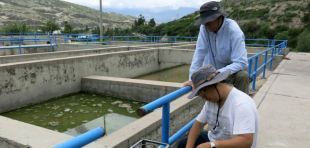World Water Day 2018

The United Nations estimates that water shortages may affect more than five billion people by 2050.
Half the world’s population – 3.6 billion people – live in regions that already face water shortages in at least one month a year, according to the United Nations World Water Development Report presented in Brasilia on 19 March by UNESCO Director-General Audrey Azoulay.
Water shortages are not just a major global risk to economies and societies; they also pose a growing challenge to the world’s ability to adapt to climate change.
The International Climate Initiative (IKI) of the German Federal Ministry for the Environment, Nature Conservation and Nuclear Safety (BMU) therefore supports a large number of projects that help make particularly vulnerable population groups and ecosystems more resilient to climate change and support stakeholders across these regions in making efficient use of water resources.
For example, the IKI is active in small island developing states that are particularly affected by climate change, such as the Caribbean island of Grenada. The rise in the sea level here increases the risk of drinking water shortages, beach erosion, floods and loss of coastal regions. A rise of half a metre in the sea level would destroy up to 83% of all beaches. Major infrastructure, such as ports, power stations, roads and housing, is also at risk.
Grenada is very vulnerable: in 2004, Hurricane Ivan destroyed almost 90% of the island’s housing, along with tourist facilities and agricultural production areas.
The island already faces water shortages, and climate models predict that by 2050, the usual water situation will be comparable to the drought Grenada faced in 2009 and 2010.
Very recently (27 February), the population of this island state achieved further success in its work to adapt to the impact of climate change with support from Germany. Grenada’s Government spent two years developing a project supported by BMU entitled ‘Climate Resilience in the Water Sector in Grenada’ (G-CREWS). The international Green Climate Fund (GCF) has now granted the project millions of dollars in funding.
The GCF funding is aimed at reducing climate-induced threats to the availability of drinking water for Grenada’s entire population, including particularly poor and at-risk groups and also the two largest sectors of the island’s economy – tourism and agriculture – which are at greatest risk from climate change. Over a period of six years, the Deutsche Gesellschaft für Internationale Zusammenarbeit (GIZ) GmbH, in partnership with the National Water and Sewerage Authority (NAWASA), the island’s Government and the Grenada Development Bank, will be implementing the G-CREWS project, which is intended to strengthen the three pillars of the island’s water system: water governance, water supply, and consumers.

However, the supply and treatment of water also offers substantial potential for reducing greenhouse gas emissions. The Water and Wastewater Companies for Climate Mitigation (WaCCliM) Project, which is financed by the IKI, supports key political decision-makers in Jordan, Mexico, Peru and Thailand at national, municipal and individual supplier level in developing CO2 reduction strategies in the water sector.
The WaCCliM project demonstrates that the water sector could substantially reduce its carbon footprint. Water and wastewater companies from Jordan, Mexico, Peru and Thailand demonstrate the potential for municipal utilities to create a circular economy in which, for example, water pumping systems are retrofitted with the aim of cutting greenhouse gas emissions while also bringing down operating costs.
Untreated wastewater is still the greatest challenge faced by municipal utilities in maintaining climate-neutral and climate-resistant water systems. Around the world, 80% of all wastewater is discharged into the environment without prior treatment, and untreated wastewater generates three times more greenhouse gas emissions than conventionally treated wastewater. Helping supply companies to become carbon-neutral requires a massive increase in wastewater treatment combined with energy-saving measures and initiatives to generate renewable energy.
Sustainable sanitary facilities that integrate natural solutions therefore play a key part in restoring and protecting our natural ecosystems and combating climate change.
The link has been copied to the clipboard
Contact
IKI Office
Zukunft – Umwelt – Gesellschaft (ZUG) gGmbH
Stresemannstraße 69-71
10963 Berlin

















